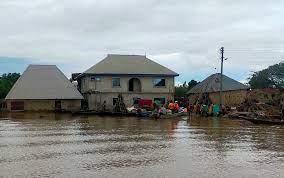The National Emergency Management Agency (NEMA) in Niger State, North Central Nigeria has called on village and district heads as well as religious leaders in communities to begin preparations to mitigate the impending effects of floods in the state this year.
Head, NEMA Minna Operations Office Hajiya Zainab Sai’du, who made the call in a statement made available to newsmen in Minna, the state capital, on Monday, May 1, 2023, explained that the call became necessary following the Annual Flood Outlook (AFO) released by the Nigeria Hydrological Service Agency (NIHSA) and the 2023 seasonal climate prediction by the Metrological Agency (NiMet).
She said the two reports are products of scientific research that have revealed that the country will suffer the probability of a flood in three categories.
“The categories are high flood risk, moderate, and low flood risk. This report also identified Niger State as among the states in the category of high-risk flood states,” she said.
Sai’du disclosed that a normal to above-normal amount of rainfall was expected in 2023 which might result in little absorption, thereby creating huge water runoff on the surface that would result in flood.
She added that other causes of flood were indiscriminate dumping of refuse in waterways, culvert, building on waterways, and refusal of riparian dwellers to relocate to higher and safer grounds during raining season.
She confirmed that the 2023 flood would affect not only riverside communities but would also affect people in urban areas in the state, adding that Niger State was predicted to experience flood between August, September, and October.
Sai’du said that it was expedient for traditional and religious leaders across the state to key into the risk reduction approach in order to reduce as well as mitigate the danger that was ahead.
“NEMA Minna Operations Office strongly calls on these community leaders too, as a matter of urgency, to lead the people of their various communities in identifying drainages/culverts that are blocked to be cleared.
“Community heads should also sensitise their people who have built on the flood plain and those living along river banks to relocate to safer and higher places,” she added.
She noted that adhering to the early warnings would help to save lives and property.
By Dare Akogun





